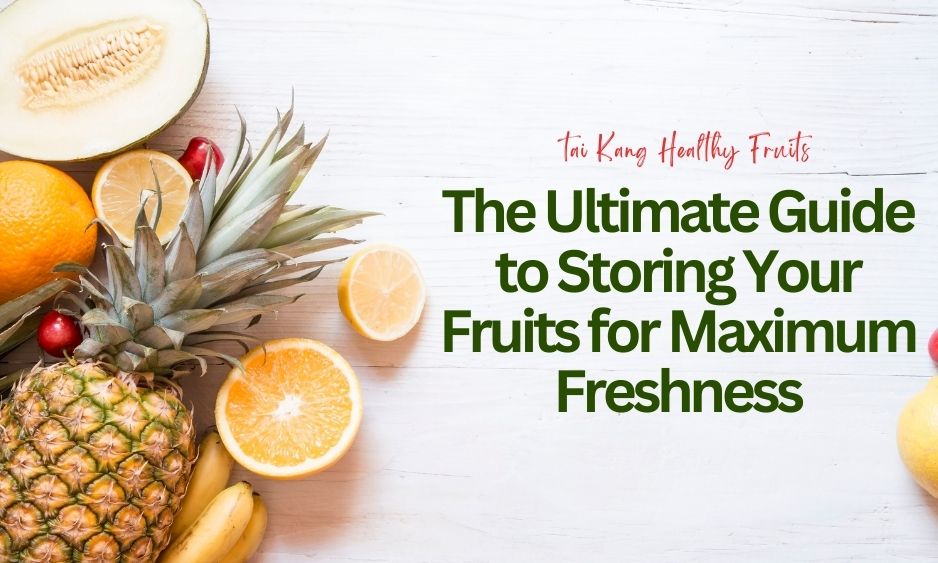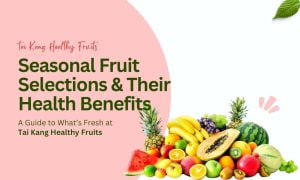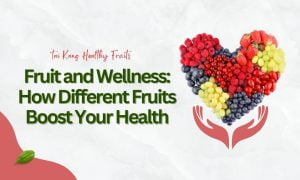
The Ultimate Guide to Storing Your Fruits for Maximum Freshness
Introduction to Proper Fruit Storage
In the quest for a healthier lifestyle, incorporating fruits into our daily diet is essential. However, equally important is knowing how to store these nutritional fresh produce correctly.
Proper storage not only extends the shelf life of fruits but also preserves their taste, texture, and nutritional value. With a myriad of fruits available from Tai Kang Healthy Fruits, understanding the nuances of fruit storage can be a game-changer in reducing waste and enjoying fruits at their best.
General Tips for Fruit Storage
Before diving into specific fruit storage guidelines, let’s cover some general principles that apply to most fruits:
- Understand Ethylene Production: Some fruits emit ethylene gas, which can hasten ripening (and over-ripening) in surrounding produce. Keep ethylene-producing fruits like bananas and apples away from ethylene-sensitive fruits like berries and melons.
- Maintain Optimal Temperature and Humidity: Most fruits thrive in a cool, slightly humid environment. The refrigerator is ideal for this, but some fruits do better at room temperature.
- Separate Fruits from Vegetables: Fruits and vegetables have different storage needs. Storing them together can lead to premature spoiling due to the ethylene gas produced by fruits.
- Check Regularly for Spoilage: Regularly inspect stored fruits and remove any that are overripe or showing signs of spoilage to prevent them from affecting others.
- Use Perforated Plastic Bags: If storing fruits in the fridge, use perforated bags to allow for air circulation and prevent moisture buildup, which can lead to rot.
- Wash Just Before Eating: Washing fruits before storage can introduce moisture that encourages mold growth. It’s best to wash fruits just before consumption.
Specific Storage Recommendations for Different Fruits
- Berries (Strawberries, Blueberries, etc.): Store in the refrigerator in their original container or a shallow bowl covered with a paper towel. Do not wash until ready to eat.
- Stone Fruits (Peaches, Plums, etc.): Leave at room temperature to ripen. Once ripe, they can be refrigerated to slow down further ripening.
- Citrus Fruits (Oranges, Lemons, etc.): Store in a cool place with good air circulation. They can be kept at room temperature but best to refrigerate for longer storage.
- Apples: Keep in a cool, dark place if storing for a few days. For longer storage, refrigerate away from other fruits and vegetables.
- Bananas: Store at room temperature. If you wish to slow ripening, place in the refrigerator; the skin will darken, but the fruit inside will remain firm.
- Melons: Store at room temperature until ripe, then refrigerate if not consumed immediately. Once cut, wrap in plastic and refrigerate.
- Grapes: Store in the refrigerator, preferably in the original packaging. Avoid washing until just before eating.
- Tropical Fruits (Mangoes, Pineapples, etc.): Store at room temperature until ripe, then refrigerate if not consumed immediately.
- Avocados: Ripen at room temperature, then refrigerate if not used immediately. To speed up ripening, store in a paper bag with an apple or banana.
Common Storage Mistakes and How to Avoid Them
Storing All Fruits in the Refrigerator:
Not all fruits benefit from refrigeration. Fruits like bananas lose flavor and texture in the cold.
Washing Fruits Before Storing:
This can introduce moisture and lead to mold growth. Wash fruits just before consumption.
Storing Fruits and Vegetables Together:
This can cause the vegetables to spoil faster due to ethylene gas produced by fruits.
Overcrowding:
Fruits need space for air circulation. Overcrowding can lead to bruising and quicker spoilage.
Ignoring Ripeness
Storing fruits that aren’t ripe in the refrigerator can prevent them from ripening properly and hence, affect taste. Conversely, not refrigerating ripe fruits can lead to over-ripening.
Storing fruits correctly is an essential skill for anyone looking to enjoy the freshest, tastiest, and most nutritious produce. By following these tips, you can extend the shelf life of your fruits from Tai Kang Healthy Fruits, enjoy their optimal flavor, and minimize food waste.
Remember, the way you store your fruits can make a significant difference in their quality and longevity. So, next time you stock up on your favorite fruits, keep these storage tips in mind for a fresh and flavorful experience every time.


